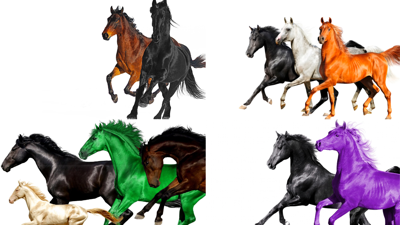
Old Town Road remix art, clockwise from top left: Feat. Billy Ray Cyrus; Feat. Billy Ray Cyrus and Diplo; Feat. RM (of BTS); Feat. Billy Ray Cyrus, Young Thug and Mason Ramsey
Lil Nas X leaped from his sister’s couch to superstardom thanks to a $30 beat that went viral on TikTok, sparked controversy and then dominated the charts. It’s a Cinderella story, and Lil Nas X himself has been a charming celebrity throughout the single’s record-breaking 17-week run at the top of Billboard’s Hot 100. His less-than-stellar EP 7 didn’t hurt his momentum much — it even produced a minor hit in “Panini,” which, unlike the bulk of the short project, actually kinda slaps. It also saw Lil Nas X exploring other ways to experiment with hip-hop, furthering his reputation as a precursor to the supposedly imminent death of genre.
But Lil Nas X — or at least the team he's working with — knows the system. Though the song shot to the top of the all-genre Hot 100 chart in the spring, it got booted from the country charts. Lil Nas X then linked up with Billy Ray Cyrus for a remix and forced his way back in. It was a classic David-slays-Goliath moment. It also marked the kickoff the second stage of the song’s Billboard run: The chart counts sales and streams of concurrent remixes towards the original’s total.
A second and third remix followed — one with Diplo, then another with Cyrus, Young Thug and Mason Ramsey. In the last week of July, just as “Old Town Road” was set to tie the record for the longest time atop the Hot 100, Lil Nas X tapped RM, of K-pop titans BTS, for a fourth remix (aka "Seoul Town Road"), which secured that record-breaking 17th week and staved off Billie Eilish’s attempt to take the top spot with a Justin Bieber-assisted remix of her own song "bad guy." Lil Nas X tweeted that this would be the last official remix — only time will tell.
Crucially, all of the "Old Town Road" remixes have clocked in at under three minutes, which is becoming more and more important to the formula of a hit single. (The original didn't pass the two-minute mark.) Fortune argues that since artists get paid per stream, it simply makes more sense to churn out shorter songs. Another conclusion could be that short songs warrant replayability. To quote Juicy J on the subject: “When you stream that motherfucker once, you stream it again.”
These are all part of broader problems, or at least growing pains, in the music industry. For example, though the songs are getting shorter, albums are getting longer. Drake’s Views had 25 tracks, but the average length of each song was shorter than in past releases, as QZ notes in a handy chart analysis. Chance the Rapper’s newest release, clocking in at over an hour, may also herald the return of skits to pad out rap albums.
More tracks at shorter lengths means more streams, thanks two album-equivalency formulas: 1,250 streams on a paid service to equal an album sale, and 10 songs sold from a project also counts as a purchase. Stuffing an album with as many songs as possible — short songs that entice repeat streaming — may seem like a sound business strategy to many labels.
And not all streams are considered equal: YouTube views and free streaming services count less than paid streams in Billboard’s calculations. Lowering the weight of YouTube views makes some sense, since artists have gamed the system in the past, gaining views through methods like buying ads on other artists’ videos. Indian rapper Paagal recently hit No. 1 on YouTube through this strategy, and Taylor Swift has been accused of similar practices. However, it also seems like this method could penalize musicians who work in languages other than English, or are based outside the continental U.S. After all, Latin artists rack up YouTube numbers that put many Western artists to shame because their fanbase makes extensive use of the platform.
In the end, it’s probably safe to say that “Old Town Road” is emblematic of many things: our love for underdog stories, a music-wide trend towards abandoning genre, and the way artists both benefit from — and sometimes inadvertently perpetuate — practices of a broken music industry that favors short songs, long albums and major buying power.
Yeehaw.





